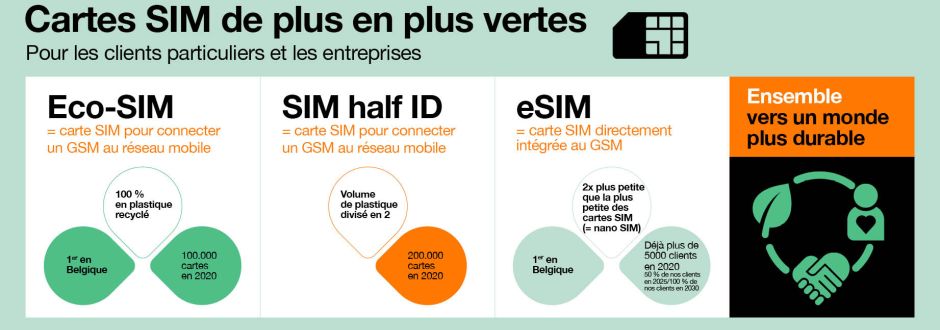Orange Belgium is the first telecom operator of Belgium, and one of the first in the world, to introduce new SIM cards which are produced with 100% recycled plastic. Combined with the recent launch of Half ID SIM and eSIM earlier this year, Orange Belgium strives hard to reduce its plastic consumption and overall footprint.
A few months after introducing its first half ID SIM cards, whose smaller size already allows a yearly economy of 2 tons of plastic usage, Orange Belgium now goes one step further by introducing on the Belgian market the first SIM cards made with 100% recycled plastic. The existing stock of SIM cards will gradually be replaced by these Eco SIMs as from today.
Moreover, these new Eco SIM cards respect the highest quality standards for residential and B2B customers, allowing them to be totally future-proof and to offer reliable connectivity, whatever the smartphone, whatever the usage conditions. Combined with the launch earlier this year of the support of eSIMs for residential customers, which allows customers with eligible smartphones to use the SIM chip directly integrated in their device, Orange Belgium can now streamline its SIM card production and significantly reduce its environmental footprint.
In terms of CO2 emissions, too, the total switch to Eco SIM cards would allow a significant 14 tons reduction by 2023 for SIM cards logistics (raw material and transportation). These new SIM cards are available as from today in Orange Belgium’s smart and concept stores.
This initiative is part of a broader strategy to reduce Orange Belgium’s environmental impact, which saw for instance an overall reduction of CO2 emissions by almost 80% since 2006. Orange Belgium also intends to reduce its remaining CO2 emissions by 30% by 2023.
Xavier Pichon, CEO of Orange Belgium, comments: “As a responsible telecom operator, we strongly believe in a relevant usage of technology to address societal challenges. By introducing this new generation of SIM cards, Orange Belgium is at the forefront, worldwide, of the fight towards more sustainable business practices. It allows us to further reduce our environmental footprint, next to other major efforts we’re making into reducing our energy consumption, our CO2 emissions and our waste production.”



